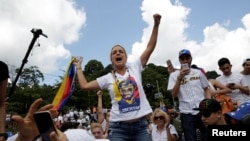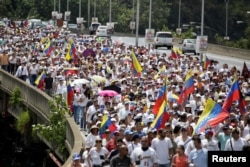Several thousand women marched on the streets of Caracas, Venezuela Saturday to protest against the suspension of a referendum effort that could have led to the ouster of President Nicolas Maduro.
The protesters, led by Lilian Tintori and Patricia Gutierrez — wives of jailed political leaders and well-known voices against the current government — closed a lane of a major highway to show their dissatisfaction the administration of Maduro.
"We're here to demand respect for the constitution, for Venezuelans to have elections to escape dictatorship," human resource worker Nayiber Bracho said.
Venezuela's electoral officials put a stop to the referendum effort Thursday after nearly a year of opposition campaigning.
Officials alleged fraud had taken place in the signature-gathering process for a referendum on the socialist leader.
"We can't handle this anymore, there is no food, there is no medicine, there is no future for my grandchildren nor for any Venezuelans," 65-year-old Maria de Guevara said.
"Of course, they have the right to request for the referendum, but they are also forced to comply with the constitution and the law. And we have the right to defend brother Nicolas Maduro, because I voted for Maduro, and I want Maduro to finish his term," said Diosdado Cabello, a lawmaker with the United Socialist Party of Venezuela.
The official announcement came as a shock to referendum supporters who called the decision unconstitutional. The order came hours after Maduro left Venezuela on a multi-nation tour of the Middle East.
Former Venezuelan presidential candidate Henrique Capriles said he and seven opposition leaders have received a court order blocking them from leaving the country.
Capriles posted the document on Twitter and wrote "Once again they are wasting their time."
"What we saw yesterday [Thursday] was a coup," Capriles told reporters. "We'll remain peaceful but we will not be taken for fools."
Public opinion polls indicate that at least 80 percent of Venezuelans want Maduro out of office.
The electoral council said the decision to stop the referendum was based on Thursday's court ruling that found fraud in the initial steps of the petition drive.
Recalling Maduro would push the Socialist Party out of power and trigger an early presidential election.
"Under no circumstance are we going to let them overthrow the government," Socialist Party second-in-command Diosdado Cabello said during a news conference on Saturday.
The recall effort had run into opposition from the election board, which imposed restrictions early on and argued that it would take until 2017 to put the proper conditions in place.
The Democratic Unity coalition urged daily protests against "anti-constitutional" conditions by the board.
But Thursday's ruling was followed by another decision after the electoral council suspended for 6 months gubernatorial elections that were scheduled for later this year.
The socialist party decided to put off elections indefinitely.
"The recall referendum has to be in 2016, the country's conditions demand it," opposition supporter Joaquin Mendoza, a 68-year-old publicist, said earlier.
"Otherwise there will be more dead in the street, more hunger," he added, citing Venezuela's high murder rate.
Venezuelan officials blame the opposition for the timing, saying the coalition took three months to reach a consensus on the referendum and that fraud was committed in a preliminary signature drive.
Countries like the United States, Brazil, Mexico, Canada, Chile and Uruguay released statements expressing concerns over the government blocking the referendum and placing travel restrictions on opposition leaders.
These countries urged Venezuela to respect human rights, find measures to assure a peaceful dialogue, and aimed the Venezuelan government to reach for "long-standing solutions in favor of democracy and social stability.







